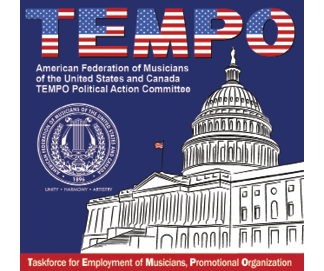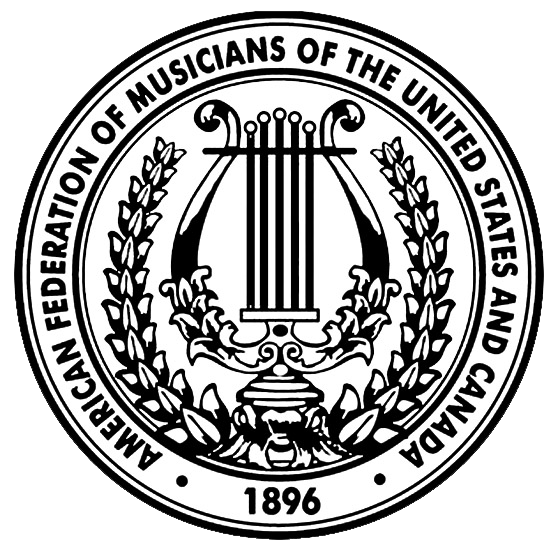Legislative Lobbying Efforts
The AFM has a record of successfully engaging Congress on issues important to your career, family, and livelihood. The purpose of the AFM National Legislative Office is to organize members of Congress to work in support of our issues. AFM members’ active involvement in legislative campaigns has made a difference.

The AFM TEMPO Fund Is Our Voice in Washington
Supporting lawmakers and candidates who champion issues important to musicians is crucial. This includes matters like artificial intelligence protections, tax policies, improved travel regulations that facilitate traveling with instruments, and stricter copyright and performance rights laws to ensure that musicians receive fair compensation for their work.
The following highlights the key legislative issues that we are actively working to address.
Artificial Intelligence
➤ Pass the Nurture Originals, Foster Art, and Keep Entertainment Safe (NO FAKES) Act (H.R. 9551/ S. 4875) and Preventing Abuse of Digital Replicas Act (PADRA) as meaningful first steps towards protecting artists from AI exploitation.
➤ Pass the Generative AI Copyright Disclosure Act to create transparency in AI. All musicians must have control of their work and receive fair compensation.
Artist Compensation
➤ Pass the American Music Fairness Act (H.R. 791) to fairly compensate artists when their music is played over terrestrial radio.
➤ Pass the Protect Working Musicians Act (H.R. 5576) to allow artists to collectively negotiate with platforms and receive fair compensation for their work.
Arts Education
➤ Pass the Arts Education for All Act (H.R. 5463) to create more opportunities for working musicians, expand access to arts participation, and train the next generation of artists.
Copyright
➤ AFM supports updating Section 512 of the Copyright Act to reflect pervasive and sophisticated online piracy. Overbroad safe harbor provisions and technological changes over the last 25 years have made Section 512 less effective.
Equality Among Musicians
➤ Pass the Equality Act (H.R. 15 / S. 5) to prohibit discrimination based on sex, sexual orientation, or gender identity. AFM supports policy measures that promote diverse talent pipelines and inclusive hiring practices
Federal Support for the Arts
➤ AFM supports increasing funding for the National Endowment for the Arts (NEA) to at least $1 per capita or roughly $336 million. NEA grants create jobs for musicians — with strong workplace protections — in all states and jurisdictions.
Tax Policy
➤ Pass the Performing Artist Tax Parity Act (H.R. 2871) to update the Qualified Performing Artist tax deduction.
➤ Pass the Tax Fairness for Workers Act (H.R. 4963 / S. 738) to restore the tax deductibility of union dues.
➤ Pass the No Tax Breaks for Union Busting Act (H.R. 5456 / S. 737) to end tax benefits for interfering in workers’ right to organize.
Ticketing Reform
➤ Pass the Fans First Act (S. 3457) to empower artists and protect consumers from predatory practices.
Worker Protections
➤ Pass the Richard L. Trumka Protecting the Right to Organize Act (H.R. 20 / S. 567) to ensure all workers have the right to organize and collective bargaining without interference.
TEMPO: Supporting Candidates Who Support Music
AFM members have joined together to support candidates who support music. For musicians, it is critical that we support lawmakers and candidates who fight for issues we care about including:
- Stricter copyright and performance rights laws guarantee that musicians are fairly compensated
- Stronger pension system so musicians have a secure retirement
- Increased National Endowment for the Arts (NEA) funding
- Improved travel regulations are making it easier to travel with instruments
- More music education so our next generation of musicians may learn their craft
Federal law prohibits dues money from being used for most political purposes. That’s why musicians have established TEMPO (Taskforce for Employment of Musicians Promotional Organization). TEMPO is solely comprised of small contributions given by AFM musicians—like you.
AFM is not soliciting contributions to TEMPO from any individual who is not a member of the American Federation of Musicians of the United States and Canada (AFM), executive or professional employee of AFM or its affiliates, or their family member living in the same household. Any contribution received from such an individual will be returned to that contributor. Only United States citizens and lawful permanent United States residents may contribute. AFM TEMPO makes contributions and expenditures in federal, state and local elections. All contributions are voluntary and an individual may refuse to contribute without any reprisal. Any guideline contribution amount is merely a suggestion and an individual is free to contribute more or less and AFM will not favor or disadvantage the individual by reason of the amount of a contribution or a decision not to contribute. Federal law requires us to use our best efforts to collect and report the name, mailing address, occupation and name of employer of individuals whose contributions exceed $200 in a calendar year. Contributions and gifts to AFM TEMPO are not tax deductible. Contributions by foreign nationals, corporations or companies are prohibited.
